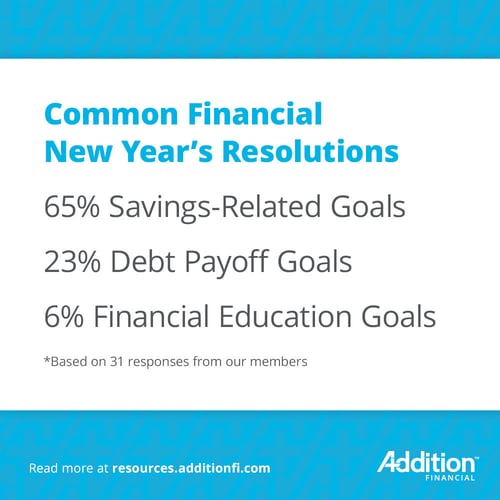There’s something about the end of one year and the start of a new one that makes us wish for a clean slate. It’s an opportunity to do things differently – specifically, to do them better. That’s why so many people make financial resolutions at the New Year.
This year, we’re celebrating not just the end of a year, but the end of the decade. We asked our Addition Financial members to share their financial resolutions with us and we noticed some common threads – smart financial goals that many of our members have in common.
Here are some of the financial resolutions we’ve heard most frequently – and some tips on how to make them work for you.

Resolution #1: Pay Down Debt
By far the most common resolution we’ve heard is related to debt. Not all debt is bad, but many of our Addition Financial members want to use the coming year as an opportunity to reduce their debt in some way.
Some of the most frequently mentioned debt-reduction resolutions and goals included:
- Paying down credit card debt, and specifically high-interest credit card debt
- Being debt free by the end of 2021
- Making payments toward the principal of a mortgage
We think paying down your debt is a very smart financial goal for 2021. Most of us carry at least a little bit of debt. If you have your credit cards under control – for example, if you have a low revolving credit balance or you pay your cards in full every month – you won’t need to worry about this resolution in the new year.
Tips for Reducing Credit Card Debt
If your resolution is to pay down or eliminate your credit card debt, here are some pointers. You’ll need to start by getting a clear picture of what you owe and where you owe it. We suggest creating a spreadsheet with your cards listed. Include the amount owed on each one plus the interest rate and minimum monthly payment, and then calculate your total credit card debt.
We recognize that it can be intimidating to take this step, particularly if you’ve accrued a lot of credit card debt. Remember that you can’t reduce your debt if you don’t know what you owe. Once you’ve got that number, here are some tips to help you get a handle on your debt and create a workable debt-reduction plan:
- Ask yourself which card causes you the most stress. For some people, it’s the highest balance. For others, it’s the card with the highest interest rate.
- Choose a debt reduction strategy. Three of the most common all have wintry names – perfect for this time of year. The Avalanche approach, the Snowball approach, and the Snowflake approach all have their merits. You can find a full description of all three in this blog post.
- Stick to your debt reduction plan by making regular payments every month.
You can figure out how long it will take you to pay off your credit card debt by using our free calculator. Keep in mind that the debt reduction strategies for credit cards can work for loans, too!
Print Now: The SMART Financial Goal Setting Worksheet
How to Pay Extra Toward Your Mortgage
Several Addition Financial members said that they wanted to make payments toward the principal of their mortgages in 2021. That’s a worthwhile goal but there are some things you should know before you adopt this resolution for yourself.
The benefits of paying your mortgage off early are clear. You can save a lot by making additional payments toward the principal, which is something most mortgage lenders will allow you to do. You’ll need to weigh the benefits against the other things you could do with the money, such as paying down credit card debt or investing in the stock market.
If you do decide to pay extra toward your mortgage, here are three suggestions for how to do it.
- Switch from a monthly payment to a biweekly payment. We like this option because it doesn’t make a huge dent in your budget, but you’ll end up making 13 full payments during the year instead of 12.
- Round up your mortgage payment each month and ask your lender to apply the extra to the principal of your loan. For example, if you had a mortgage payment of $1,225 per month, you could round it up to $1,300. At the end of the year, you’ll have paid an additional $900 of your principal.
- Put windfall payments toward the principal of your mortgage. If you receive a holiday bonus or a signing bonus for a new job, put it toward your principal.
Keep in mind that money you put toward the principal will reduce both the principal and your interest payments. If you do it consistently, you can shorten your mortgage term and save thousands of dollars.
A related option is to refinance your mortgage for a shorter term. Check out our mortgage refinancing calculator to see if this option is something that can work for you.
Resolution #2: Be More Careful with Spending
Another very common set of resolutions centered around two related issues: budgeting and spending. If you’re someone who doesn’t have a monthly or annual budget or you tend to be careless with your money, then resolutions in this category might appeal to you.
Here are some of the spending and budget resolutions our members are making for 2021:
- Be more frugal. (As one member put it, “Use it up, wear it out, make it do or do without!”)
- Understand where the money you make is being spent.
- Spend less on entertainment and save for other things.
These are all smart financial goals and ones that we can help you achieve. Let’s look at some pointers to live more frugally in 2021.
- Look at your spending for the past 3 to 6 months and figure out where your money is going. This can be an eye-opening experience because if you don’t have a budget, you may not realize how much you’re spending on dining out or extras.
- Identify areas where you believe you’re overspending and figure out how to cut back. Some specific areas our members mentioned were eating out, buying craft supplies and entertaining their kids.
- If you don’t already have one, create a monthly budget for yourself and your family and stick to it. Make sure to address the areas where you think you have been overspending. You can use our free monthly budget expenses calculator to get started.
If your financial circumstances change over the course of the year, then you should update your budget too.

Resolution #3: Save and Invest More Money
The third trend we noticed among Addition Financial members was the desire to save and invest money in 2021. There were a lot of specific resolutions, and here are a few examples:
- Save money kids’ college education and expenses
- Put money into an IRA every month or contribute more to a 401k
- Put money in a high-interest savings account
- Save money for travel and vacations
- Save for a down payment on a home
- Establish an emergency fund
As you can see, this was a popular category and there are lots of smart financial goals centered around saving and investing your money.
Let’s start with some general tips on how to save money, whether you’re saving for a goal or wanting to invest the money you save:
- Build your savings goals into your monthly budget. For example, if you want to set aside $200 per month for a family vacation, put that into your budget as a line item. When you get paid, transfer that money into a savings account where it will accrue interest.
- Set up an automatic transfer from your checking to your savings account. We recommend coordinating the transfer with your pay schedule at work.
- Set aside every $5 or $10 bill you receive and make a weekly or monthly deposit into your savings account.
- Put spare change into a jar to save for short-term goals.
Here are a few tips that address some of the specific goals our members want to prioritize:
- Use some of your existing savings or a holiday bonus to set up an IRA.
- Change your 401(k) withholding to contribute more money each month – and if your employer offers matching contributions, take advantage of them, too!
- Open a Coverdell Education Savings account to help your kids pay for college.
- Open a Holiday and Summer Savings account to save for your vacation or for next year’s holiday shopping.
At Addition Financial, we have the tools and guidance you need to meet your 2021 financial resolutions and smart financial goals. We hope that reading about some of the resolutions other members have made, you’ll feel inspired to set your own financial goals for the new year.
Do you need some guidance to meet your financial goals? Click here to access our Financial Education Resources Center or here to become an Addition Financial member!



